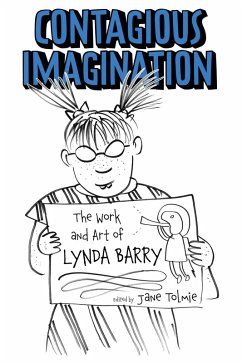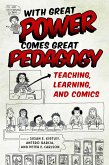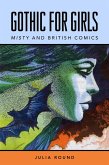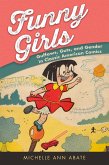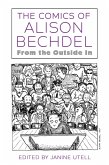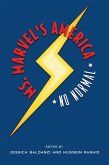Contributions by Frederick Luis Aldama, Melissa Burgess, Susan Kirtley, Rachel Luria, Ursula Murray Husted, Mark O'Connor, Allan Pero, Davida Pines, Tara Prescott-Johnson, Jane Tolmie, Rachel Trousdale, Elaine Claire Villacorta, and Glenn Willmott
Lynda Barry (b. 1956) is best known for her distinctive style and unique voice, first popularized in her underground weekly comic Ernie Pook's Comeek. Since then, she has published prolifically, including numerous comics, illustrated novels, and nonfiction books exploring the creative process. Barry's work is genre- and form-bending, often using collage to create what she calls "word with drawing" vignettes. Her art, imaginative and self-reflective, allows her to discuss gender, race, relationships, memory, and her personal, everyday lived experience. It is through this experience that Barry examines the creative process and offers to readers ways to record and examine their own lives.
The essays in Contagious Imagination: The Work and Art of Lynda Barry, edited by Jane Tolmie, study the pedagogy of Barry's work and its application academically and practically. Examining Barry's career and work from the point of view of research-creation, Contagious Imagination applies Barry's unique mixture of teaching, art, learning, and creativity to the very form of the volume, exploring Barry's imaginative praxis and offering readers their own.
With a foreword by Frederick Luis Aldama and an afterword by Glenn Willmott, this volume explores the impact of Barry's work in and out of the classroom. Divided into four sections-Teaching and Learning, which focuses on critical pedagogy; Comics and Autobiography, which targets various practices of rememorying; Cruddy, a self-explanatory category that offers two extraordinary critical interventions into Barry criticism around a challenging text; and Research-Creation, which offers two creative, synthetic artistic pieces that embody and enact Barry's own mixed academic and creative investments-this book offers numerous inroads into Barry's idiosyncratic imagination and what it can teach us about ourselves.
Lynda Barry (b. 1956) is best known for her distinctive style and unique voice, first popularized in her underground weekly comic Ernie Pook's Comeek. Since then, she has published prolifically, including numerous comics, illustrated novels, and nonfiction books exploring the creative process. Barry's work is genre- and form-bending, often using collage to create what she calls "word with drawing" vignettes. Her art, imaginative and self-reflective, allows her to discuss gender, race, relationships, memory, and her personal, everyday lived experience. It is through this experience that Barry examines the creative process and offers to readers ways to record and examine their own lives.
The essays in Contagious Imagination: The Work and Art of Lynda Barry, edited by Jane Tolmie, study the pedagogy of Barry's work and its application academically and practically. Examining Barry's career and work from the point of view of research-creation, Contagious Imagination applies Barry's unique mixture of teaching, art, learning, and creativity to the very form of the volume, exploring Barry's imaginative praxis and offering readers their own.
With a foreword by Frederick Luis Aldama and an afterword by Glenn Willmott, this volume explores the impact of Barry's work in and out of the classroom. Divided into four sections-Teaching and Learning, which focuses on critical pedagogy; Comics and Autobiography, which targets various practices of rememorying; Cruddy, a self-explanatory category that offers two extraordinary critical interventions into Barry criticism around a challenging text; and Research-Creation, which offers two creative, synthetic artistic pieces that embody and enact Barry's own mixed academic and creative investments-this book offers numerous inroads into Barry's idiosyncratic imagination and what it can teach us about ourselves.
Dieser Download kann aus rechtlichen Gründen nur mit Rechnungsadresse in A, D ausgeliefert werden.

